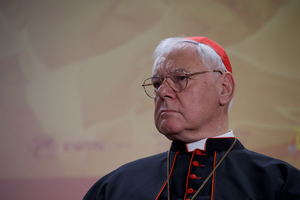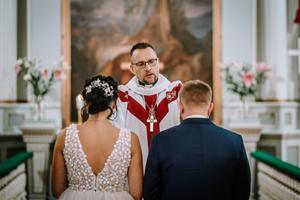Pope Francis’ US Voyage: What Awaits the Holy Father?
Vatican officials discuss the Pope's inaugural U.S. visit, which begins Tuesday.

VATICAN CITY — In his July 13 in-flight interview to Rome from Paraguay, Pope Francis indicated that he would “have to begin to study” for his first trip to the United States.
Time will tell if his preparation has paid off.
Francis will become the third pope to visit the White House, when President Barack Obama welcomes him there at the beginning of his much anticipated five-and-a-half day apostolic voyage.
The intense, three-city visit will include the canonization Mass of Junípero Serra in Washington, addresses to Congress and the United Nations and two papal Masses at the World Meeting of Families in Philadelphia.
It will be the Holy Father’s first ever visit to the United States and will follow a visit of three full days to Cuba.
As the 2016 presidential campaign heats up, much of the focus of the trip will be on what the Pope says during the 14 addresses scheduled during the visit, with all eyes closely on his speech to Congress on the morning of Sept. 24.
The Pope will want to help the American people to “recognize the tender mercy of God and to encourage them to true conversion,” said Opus Dei Father Robert Gahl, an American priest and associate professor of moral philosophy at the Pontifical University of the Holy Cross in Rome. “He will speak to hearts through practical gestures.”
But Father Gahl said observers would “err to interpret the Pope’s words through the lens of partisan politics or false alternatives like right vs. left or capitalism vs. communism.” Pope Francis, Father Gahl told the Register, “will speak about political issues, but from a pastoral perspective and with the heart of a shepherd.”
He expects him to address hot-button issues such as immigration, abortion, climate change, marriage and the death penalty. “Probably, he will address at least five of these issues,” he said, “and he will do so with concern for the poor and the marginalized. He will not speak about these issues to score points for one candidate or another or for one party or another. He will assert that we all have an obligation to care for refugees and for the poor, whether or not they are U.S. citizens.”
Furthermore, Father Gahl expects the Pope to defend “the permanence of marriage” and the need for marital fidelity, with special concern for children suffering from divorce. He also thinks the Pope will call for “an executive amnesty” to pardon repentant criminals, as well as an end to the death penalty. On his last day, the Pope is to visit to detainees at Curran-Fromhold Correctional Facility in Philadelphia.
But the Pope is not expected to enter into the particulars of policy. An inside-Rome source said the Pope doesn’t want to appear to be meddling in politics and will be “sensible and careful.” To Congress, the source said he is expected to make reference to the Holy See-brokered rapprochement between the U.S. and Cuba and is likely to refer to the Iran nuclear deal, saying it is a step towards a safer world, “in the context of dialogue being a good thing.”
The Pope is to speak to congressional leaders in English, but almost all of his other addresses and homilies will be in Spanish, including his speech to the United Nations. Any extemporaneous comments, which Francis often likes to include, are also expected to be in Spanish.
At the United Nations, informed Vatican sources have told the Register his speech will be “in the same vein” as those given by his predecessors, especially John Paul II’s speech there in 1995 and Benedict XVI’s in 2008.
“He will try to develop and explain the positions of the Church concerning development and international policies, based on the dignity and transcendence of the human person,” said an official involved in the visit. “He will combine concepts in his encyclical Laudato Si (The Care for Our Common Home) with the language of Benedict XVI — and bring in problems affecting different countries.”
“As in previous visits of the Holy Father, he will discuss war, humanitarian problems and the issue of migration and refugees,” the official added. “Of course, he may change everything in his speech beforehand, one never knows, but at the U.N. he will give an overview of the main humanitarian crises and discuss concepts of the world economy, but based on the premise of upholding human dignity.”
But the official warned against reading misinterpretations of the Pope’s stance on key issues such as the U.N.’s “Sustainable Development Goals” (SDGs) for 2030, which call for “universal access to sexual and reproductive health-care services, including for family planning” — usually U.N. speak for abortion and contraception.
Highlighting Laudato Si, he said the Pope clearly condemns abortion and gender ideology, and the Holy See’s position has not changed (it recently issued a statement underlining its position on the SDGs, which will be updated Sept. 30 after the Pope’s U.N. address). “The Holy Father is not saying anything on this issue that John Paul II didn’t say,” the official said.
U.S. Ambassador to the Holy See Kenneth Hackett believes the Pope “might speak about the excesses of capitalism” during the visit, which Francis sees as “insidious and harmful” to people. “I think most Americans would agree with him — nobody is in favor of excessive and abusive capitalism. So he may talk about that type of thing.” But Hackett said he didn’t think he “harbored any animus towards the capitalist system, where most people work hard [for a living].”
The Vatican is also concerned that the Pope’s views on capitalism have been misconstrued and is keen to point out that Francis has denounced the economic system but not capitalism per se. In July, the Pope said the unfettered pursuit of money is “the dung of the devil.”
“He strongly favors free trade and entrepreneurship,” said the Holy See official. “What he condemns is when capitalism can become an association between the most powerful people and governments, as shown in China. The Pope is speaking in defense of the poorest.” In short, he said Francis’ views on the economy have been manipulated by the media, and his views on the U.N.’s SDGs have been over-simplified. “It’s important to read his words quietly and with attention,” the official said.
At the World Meeting of Families in Philadelphia, some observers believe he will reveal some of his goals for the upcoming Ordinary Synod of Bishops on the Family. But Father Gahl reassured anyone concerned to “expect him to confirm fidelity to the faith, handed down by Jesus and the apostles, regarding marriage and the holy Eucharist.”
Speaking at the opening of the new premises of the U.S. Embassy to the Holy See on Sept. 9, Ambassador Hackett said “collaboration is increasing” between the U.S. and the Holy See. He added that the new embassy, which has double the space of the previous one, but which is an annex to the U.S. Embassy to Italy, is a sign of the high regard and level of cooperation the U.S. and the Holy See have for each other.
Inside sources say that relations between the Holy See and the U.S. are as strong as they were under the Bush administration, and although there are major differences over life and family issues, when it comes to dealing with “hot spots” around the world, the two “work together well.”
Edward Pentin is the Register’s Rome correspondent.
The Register and EWTN will proivide exclusive coverage of Pope Francis' Sept. 22-27 apostolic voyage to the United States and the World Meeting of Families.
- Keywords:
- edward pentin
- father robert gahl
- laudato si
- new york
- philadelphia
- pope francis
- united nations
- united states
- washington
- world meeting of families


















